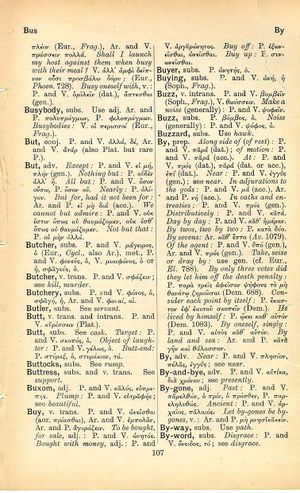but: Difference between revisions
From LSJ
ἰσότης φιλότητα ἀπεργάζεται → equality leads to friendship
mNo edit summary |
m (Woodhouse1 replacement) |
||
| Line 1: | Line 1: | ||
{{Woodhouse1 | {{Woodhouse1 | ||
|Text=[[File:woodhouse_107.jpg|thumb|link={{filepath:woodhouse_107.jpg}}]] | |Text=[[File:woodhouse_107.jpg|thumb|link={{filepath:woodhouse_107.jpg}}]] | ||
===conjunction=== | |||
P. and V. [[ἀλλά]], δέ, Ar. and V. [[ἀτάρ]] (also | [[prose|P.]] and [[verse|V.]] [[ἀλλά]], δέ, [[Aristophanes|Ar.]] and [[verse|V.]] [[ἀτάρ]] (also [[Plato]] but rare [[prose|P.]]). | ||
===adverb=== | |||
[[except]]: P. and V. εἰ μή, [[πλήν]] (gen.). | [[except]]: [[prose|P.]] and [[verse|V.]] [[εἰ μή]], [[πλήν]] (gen.). | ||
[[nothing but]]: P. οὐδὲν | [[nothing but]]: [[prose|P.]] [[οὐδὲν ἀλλ' ἤ]]. | ||
[[all but]]: P. and V. | [[all but]]: [[prose|P.]] and [[verse|V.]] [[ὅσον οὔπω]], [[prose|P.]] [[ὅσον οὐ]]. | ||
[[nearly]]: P. ὀλίγου. | [[nearly]]: [[prose|P.]] [[ὀλίγου]]. | ||
[[but for]], [[had it not been for]]: Ar. and P. εἰ μὴ διά (acc.). | [[but for]], [[had it not been for]]: [[Aristophanes|Ar.]] and [[prose|P.]] [[εἰ μὴ διά]] (acc.). | ||
[[we cannot but admire]]: P. and V. οὐκ ἔστιν | [[we cannot but admire]]: [[prose|P.]] and [[verse|V.]] [[οὐκ ἔστιν ὅπως οὐ θαυμάζομεν, οὐκ ἔσθ' ὅπως οὐ θαυμάζομεν]]. | ||
[[not but that]]: P. οὐ μὴν | [[not but that]]: [[prose|P.]] [[οὐ μὴν ἀλλά]]. | ||
}} | }} | ||
Revision as of 09:16, 20 May 2020
English > Greek (Woodhouse)
conjunction
P. and V. ἀλλά, δέ, Ar. and V. ἀτάρ (also Plato but rare P.).
adverb
except: P. and V. εἰ μή, πλήν (gen.).
all but: P. and V. ὅσον οὔπω, P. ὅσον οὐ.
but for, had it not been for: Ar. and P. εἰ μὴ διά (acc.).
we cannot but admire: P. and V. οὐκ ἔστιν ὅπως οὐ θαυμάζομεν, οὐκ ἔσθ' ὅπως οὐ θαυμάζομεν.

